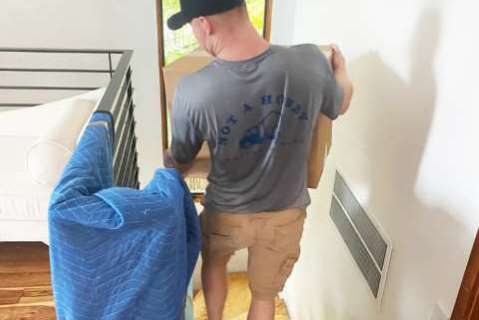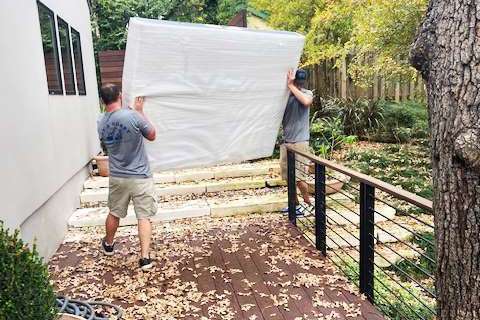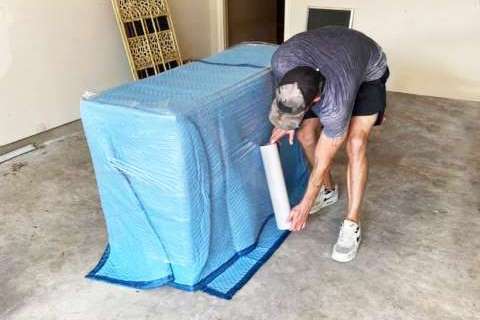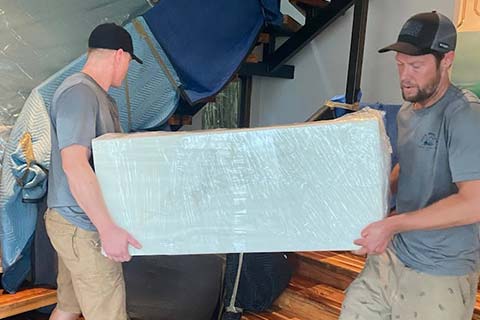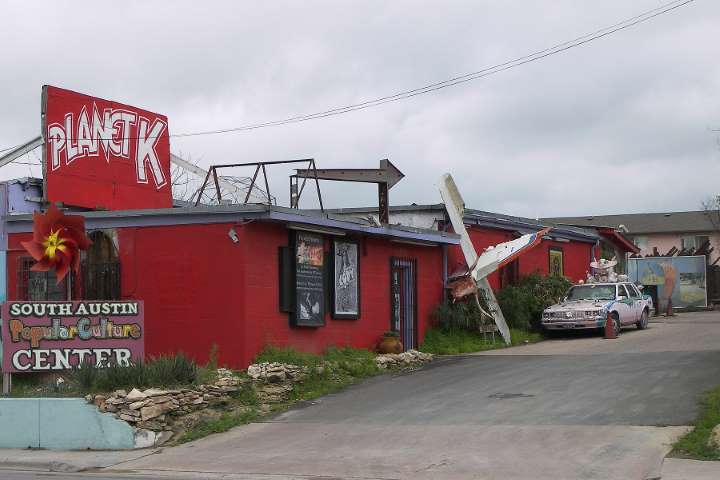HOME MOVERS IN AUSTIN
Let’s Make This Move Fast, Fun & Affordable
- 900+ Five Star Reviews
- Loading / Unloading Services
- Shrink Wrap & Tape Included
- Free Blankets & Pads Included
- Packing & Unpacking Services
- Furniture Disassembly & Reassembly
- Hauling & Removal
- Long Distance Moving
or CALL US NOW: (512) 826-8833
Your Local Moving Team
Need dependable Austin movers you can trust?
Not A Hobby Moving offers top-rated moving services in Austin, specializing in local moves across Austin, as well as long-distance relocations within Texas.
Our professional movers ensure your belongings are handled with care from start to finish. We make the process smooth and stress-free.
Contact Not A Hobby Moving for expert service backed by experience and local know-how.

Austin House Movers & Home Moving Services Near You
Not A Hobby Moving is your answer to finding affordable, reliable, and expert home movers in Austin.
We offer full moving services that include packing, unpacking, loading, and unloading.
Our movers bring a can-do attitude, timeliness, transparency, and open communication. We make moving enjoyable and to us, “it’s not a hobby fellas!”
We may not be ruling the golf course, but we are ruling the moving industry in Austin.
Your belongings are safe and secure in the hands of our experts. We have the moving experience in Austin you are looking for.
Contact us for your free moving quote. Our blog has lots of helpful articles on moving tips and strategies to help you in your next move.
Hourly Pricing
Available
Locally Owned
& Operated
Free
Estimates
Satisfaction
Guaranteed
Offers
Insurance
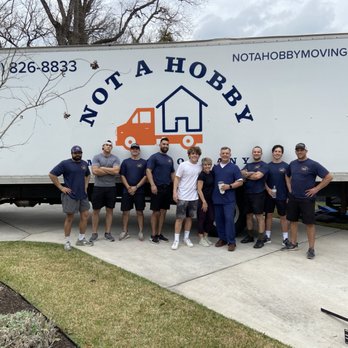


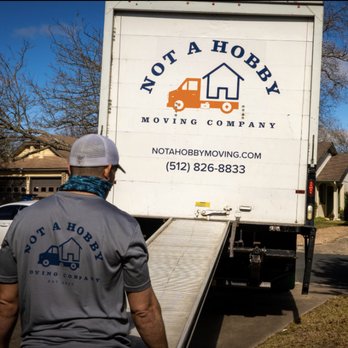
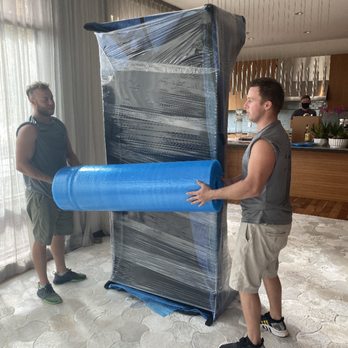
Expertise
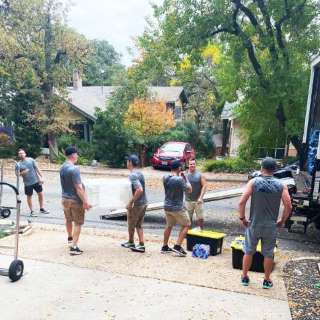
Not A Hobby Moving was founded in 2020. Together we bring over seven years of experience in the moving industry to our business. We are proud to serve our Austin community and all the surrounding neighborhoods – and the state of Texas.
Safety

Our moving professionals use the highest standards of safety during your move. Using the OSHA safety standards, our team members follow the federal regulations and use them to ensure not only the safety of our team but our clients as well.
Available 24/7

Not A Hobby Moving is available for our clients 24 hours a day, 7 days a week. We provide these services because moving is not always easily facilitated during business hours.
Ready to Move? Get A Free Quote
Our Services
Moving Services
Additional services
Ready to Move? Get A Free Quote
Professional Home & House Moving Services in North & South Austin
At Not A Hobby Moving, we specialize in residential moving across the Austin area, offering stress-free support for families, individuals, and property owners. Whether you’re transitioning from a house in South Austin, relocating to a new home in Leander, or coordinating a residential move across North Austin neighborhoods, we bring local knowledge, expert care, and full-service solutions.
House Movers Austin: Neighborhood Coverage Across the City
Austin is spread out, and moving across town can be a project. That’s why it helps to work with movers who understand every area—from tricky parking spots in Downtown to narrow roads in Hyde Park.
We’ve worked across:
North Austin Movers: Local Help From a Team That Knows the Area
Our North Austin movers are familiar with neighborhoods like Cedar Park, Great Hills, and Northwest Hills. If you’re doing a residential move in North Austin, you need a team that knows how to handle HOA rules, apartment layouts, and early morning loading without waking the neighbors.
We’ve completed moves in:
Looking for a north Austin moving company that doesn’t overcharge or show up late? That’s where we come in.
South Austin Home Movers: Smooth Relocations From Start to Finish
In South Austin, we serve vibrant neighborhoods like Bouldin Creek, Travis Heights, and South Lamar. If you’re searching for home movers in South Austin who understand the culture and challenges of the area, our team delivers. From single-family homes to duplex moves and everything in between, we’re your reliable partner for the entire process.
Full-Service Moving in Austin, TX: What It Means for You
When people hear “full-service moving company in Austin,” they think it’s going to cost a lot or come with fine print. Not here. Full service means we handle the parts most people want to avoid.
What we offer:
Supplies like boxes and blankets
Careful handling of items—no shortcuts
No surprise fees
Our goal is to make your move stress-free, whether you’re relocating to a new home in the city or transferring items from a residence into a storage facility. We also assist with apartment moving in Leander, North Austin, and other communities.
Why Not A Hobby Moving Stands Out
We’re called Not A Hobby Moving because this isn’t just a side gig—it’s what we do all week, every week. From local home moves to long-distance relocation, we’ve built a name around dependable work.
Why people stick with us:
Clear communication
Skilled crew that respects your time
Positive reviews from real clients
Support for everything from heavy furniture to last-minute requests
We don’t cancel or reschedule once you’re on the calendar. If we say we’re going to move your home on a certain day, we show up ready to make it happen.
Moving Homes Across Greater Austin
Our home moving services extend beyond city limits. Whether you’re relocating from an apartment in Leander or a family home in Round Rock, we provide door-to-door service and thorough planning. Residential moves in areas like Manor, Sunset Valley, and even East Texas towns are all part of our service zone.
Let’s Make Your Home Move Happen
If you’re looking for residential movers in Austin, TX, who care about getting the job done right, Not A Hobby Moving is here to help. Whether it’s your first home, a growing household, or a downsizing move into something simpler, we’ll get you settled.
Contact us today to request your custom moving quote and learn more about our residential moving services.
Ready to Move? Get A Free Quote
Austin Residential/House Movers - FAQs
Why is house moving so stressful?
Moving involves a combination of emotional, logistical, and practical challenges that can contribute to its stressful nature including:
Change and Uncertainty: Moving represents a significant life change, involving leaving behind familiar surroundings, routines, and support systems. The uncertainty of the new environment can lead to stress. Moving to a new place means adapting to a new community, job, or school. The fear of the unknown and the need to establish new routines can be anxiety-inducing.
Logistics: The logistics of planning, packing, and organizing a move can be overwhelming, requiring careful coordination and it can be time-consuming.
Financial Pressure: Moving involves expenses, like hiring movers, transportation, and potentially higher living costs in a new location. Financial concerns can add stress.
Emotional Attachment: Saying goodbye to a place where you have memories and emotional attachments can be emotionally taxing.
Packing and Unpacking: Packing up all your belongings, ensuring they are properly protected, and then unpacking them at the new place can be physically and mentally exhausting.
Time Pressure: Moving is time-sensitive, with deadlines to vacate your old residence and settle into the new one. Time pressure can lead to stress.
Physical Strain: The physical labor involved in moving, from lifting heavy boxes to assembling furniture, can lead to exhaustion and stress.
Decision Fatigue: Making decisions about what to keep, sell, donate, or discard can be mentally taxing.
Administrative Tasks: Handling administrative tasks like changing addresses, transferring utilities, and updating documents can be burdensome.
Distance from Loved Ones: Moving may mean being farther from friends and family, increasing feelings of isolation and loneliness.
What is the best time to move?
Choosing the best time to move can affect your costs and the availability of residential/house movers:
- Spring and Fall: Considered ideal due to milder weather and more flexible scheduling.
- Summer: Popular but busy and potentially more expensive.
- Winter: Affordable but can be challenging in regions with harsh winters.
- Weekdays: Weekdays (Monday to Thursday) typically have more availability than weekends
Avoid Peak Days: Steer clear of peak moving days like month beginnings, ends, and holidays.
Is it better to move on weekends or weekdays?
Reasons why it’s better to move on weekdays than weekends are:
- Availability
- Cost savings
- Less traffic
- Access to utility services
- Scheduling flexibility
- Movers’ availability
When should I start packing my house for moving?
Start packing your house for a move at least 4-8 weeks before your moving date, gradually working through one room at a time. Start with items you use less frequently and prioritize packing essentials last. This timeline allows for a more organized and less stressful packing process If you plan to prepare for a full-service move, our packing team at Not A Hobby Moving will provide packing and unpacking services for you and also bring all the packing supplies.
Where do you start when you move?
To get organized and stay on track during your move, refer to this checklist:
- Set a moving date and budget.
- Declutter and organize belongings.
- Hire professional moving services.
Notify utilities and update your address. - Acquire packing supplies.
- Create an inventory list.
- Pack room by room, labeling boxes.
- Prepare an essentials box.
- Notify contacts and update healthcare records.
- Prepare your vehicle if you’re planning a long distance move.
- Confirm moving details with the moving company.
- Pack valuables separately.
- Complete last-minute tasks.
- Conduct a final home walkthrough.
- Be ready for moving day.
How do you pack a bedroom fast?
Packing a bedroom quickly is manageable with proper planning and organization. Here are steps to help you pack your bedroom fast:
- Gather Supplies: Get boxes, tape, bubble wrap, markers.
- Declutter: Sort what to keep, donate, or discard.
- Categorize: Group similar items together.
- Start with Clothing: Pack clothes neatly or use wardrobe boxes.
- Pack Books and Decor: Box books and décor, fill with soft items.
- Bedding and Linens: Pack bedding, pillows, and linens.
- Fragile Items: Wrap fragile items securely.
- Label Boxes: Clearly label with contents and room.
- Furniture: Disassemble if needed.
- Bed: Take apart the bed and protect the mattress.
- Personal Items: Pack jewelry, toiletries, and meds separately.
- Essentials Box: Prepare items for immediate use.
- Seal Boxes: Securely seal with packing tape.
- Label and Inventory: Keep a list and label boxes.
- Stay Organized: Maintain a checklist.
What should I do the night before my movers?
Being well-prepared the night before your move can help ensure a smoother and less stressful transition to your new residence. The night before your movers arrive, complete these ten important tasks for peace of mind before the big moving day:
- Final Packing: Finish packing any remaining items and ensure all boxes are properly labeled.
- Essentials Bag: Prepare an essentials bag with items you’ll need for the first day in your new home, such as toiletries, a change of clothes, important documents, and snacks.
- Disconnect Appliances: Unplug and prepare appliances like the refrigerator and washer/dryer for transportation.
- Clear Pathways: Ensure that hallways and pathways are clear for the movers to navigate easily.
- Confirm Details: Double-check the moving schedule and details with your moving company to ensure everything is on track.
- Valuables: Safely pack and transport valuable items like jewelry, important documents, and electronics with you rather than on the moving truck.
- Payment: Prepare payment for the movers if you haven’t already arranged it in advance.
- Take Photos: Document the condition of your belongings and any valuable or fragile items before your move.
- Checklist: Walk through each room to make sure you haven’t forgotten anything important.
- Get a Good Night’s Sleep: Ensure you get a good night’s sleep so you’re well-rested and prepared for the demands of the moving day ahead.
How far in advance should you schedule local residential movers?
To secure your preferred moving date and ensure the availability of reputable local movers, it’s a good idea to schedule at least 2-4 weeks in advance, especially if you’re planning to move during peak times. The ideal timing can vary based on:
Time of Year: Moving companies are busier during spring and summer, so booking further in advance is wise during these times.
Move Date: If you have flexibility with your move date, you may have an easier time securing movers on short notice. If you have a specific date in mind, book well in advance to ensure availability.
Size and Complexity: Larger, more complex moves may require additional planning and scheduling, so booking earlier is smart
Availability: Check with local moving companies for their availability and preferred booking timelines. Some reputable movers may have limited availability during peak periods. For last minute moving, contact your mover as soon as possible to ensure they will be available. Special Requirements: If you have specific requirements, like needing specialty equipment, booking in advance ensures your needs are met.
How much do residential movers cost in Austin, TX?
The cost of a residential move in Austin depends on several factors, such as distance, the size of the home, and the timeframe. Hiring a moving company for a long-distance move will be significantly more expensive than relocating from a city to a different neighborhood. However, if you’re moving between major cities, your mindset may need to change to account for the fact that moving costs vary from city to city.
Additionally, moving companies can charge by the hour or by a flat rate which can change the overall price. Flat rates are often more affordable and easier to gauge. Consider add-on services too such as having the company do the packing and unpacking. These types of services cost extra but may be worth the cost depending on your needs and budget.
On average, local moves cost between:
- Studio or 1 Bedroom – $200 to $700
- 2 Bedroom – $400 to $800
- 3 Bedroom – $800 to $2,000
- 4 Bedroom – $1,000 to $2,000
- 5 Bedrooms and up – $2,500 and up
When it comes to moves that cover a significant distance, the cost is typically determined by the total weight of the belongings being moved. In the majority of circumstances, this will amount to approximately $0.70 per pound of merchandise for every 1,000 miles traveled; this does not include any additional fees.
Full service moves including packing and unpacking can raise the rates even higher. If you decide to go with a full-service move for your relocation to Austin, your movers will pack up all of your belongings, including your furniture, into boxes, load them onto the moving truck, transport them, and unload them at your new residence. All of this will be done in a safe and secure manner and can include placing unpacked items in the right spot.
Expect to pay by the hour for an unpacking service, typically falling between $25 and $50 for each mover for each hour worked. Alternatively, you should budget an additional hourly rate of approximately $400 for your movers to pack and unpack your home. It is a good idea to include a gratuity (or tip) in your calculations when figuring out how much it will cost to hire movers in Austin between 5 and 20 percent depending on the distance.
What forms of payment do you accept for your residential moves?
Established moving companies offer multiple methods of payment, including cash, personal checks, money orders, company checks, and credit cards. Be wary of any company that only accepts cash as they may not offer legitimate moving services backed by the government. Always check the company’s website and reviews to ensure they are a legitimate business to prevent complications. They should also have insurance or do not give them your money.
As a safety precaution, some movers choose not to take payments in cash to forestall any possibility of loss or theft. On the other hand, credit cards are typically a better choice when it comes to long-distance interstate moves because the associated costs can easily reach the thousands. It is risky to carry around a large amount of cash, and most credit card companies have customer assistance programs in place to assist cardholders who have been the victim of fraud.
What do movers do for home moves?
Full-service movers will handle everything involved in your relocation to a new home. Moving companies that offer full service will provide everything that is necessary for your relocation, including shipping supplies such as furniture, blankets, and additional padding. Of course, packing the truck, driving to the new location, and unloading the truck into your new home.
If you prefer to pack yourself, the movers will move all of your items from your old house to your new house. This method can save you money as the movers will be doing less work. Many people prefer to pack for themselves so they can follow a labeling system or keep grouped items packed together. However, professionals can pack in a fraction of the time of the average person and with more care for fragile items.
Additionally, hired movers will ensure that all of your large, cumbersome, and heavy furniture arrives safely at its new location. Assembling and disassembling furniture, either in part or in its entirety, as necessary, is included in this service (and reassembly when the time comes).
The best part of hiring professionals is they can handle the heavy lifting. Most people do not move furniture often and find themselves winded and uncomfortable with aches and pains after the first few hours. Professionals do this for a living, and what’s difficult for the average person is easy for them, making the work faster, safer, and more efficient.
Carrying your personal effects from place to place. Full-service movers will transport all of your belongings to your new location for you, regardless of whether you are moving down the street or across the country. You will be given a delivery window for when your items will arrive, and all you have to worry about is getting yourself to the location where the shipment will be delivered so that you can unpack the boxes. After, the movers may even take the boxes from you to make the process easier.
How long does moving in Austin take?
Moving your belongings and packing them up on your own can take days or weeks. If you hire movers who provide full service, you will have a set timetable and a better idea of how long the entire process will take. On average, you can expect moves to take:
- Studio – 2 to 3 hours
- 1 Bedroom – 400-600 sq. ft. – 4 to 5 hours
- 2 Bedroom – 700-1,200 sq. ft – 5 to 7 hours
- 3 Bedroom – 1,100-2,000 sq. ft. – 5 to 9 hours
- 4 Bedroom – 1,500-2,500 sq. ft. – 7 to 10 hours
- 5 Bedrooms and up – 2,000 or more sq. Ft. – 8 to 10 hours
If you want the company to do the packing and unpacking as well you can add a few more hours. Also, add time for items that are extra large or difficult to handle, like pianos or hot tubs. Having the movers assemble and disassemble your items can add to the timeline, as does moving appliances.
Do house movers expect you to help?
While residential movers are typically hired to handle the heavy lifting and transportation of your belongings, they don’t typically expect homeowners to assist with the actual moving process. Our Not A Hobby Moving professional movers in Austin, Texas are trained and equipped to handle all aspects of yourmove, including packing, loading, unloading, and transport. There are situations where homeowners may choose to assist with:
- Packing: Homeowners can pack their belongings themselves or select a full-service move including professional packing services.
- Small Items: Some people prefer to transport smaller or more valuable items personally.
- Supervision: Some homeowners like to be present during the move to oversee the process, answer questions, and provide specific instructions.
- Personal Preferences: If you have specific preferences or concerns about certain items, you can communicate them to your movers.
What size truck do I need for a residential move in Austin?
The size of truck depends on the quantity and size of items in your home. Smaller moves like a studio or one-bedroom apartment will need a significantly smaller truck than a five-bedroom home. Your home’s bedrooms and square footage are two of the most common methods of calculating the size of the truck.
On average, homes or apartments with two or fewer bedrooms require a 15-foot-long truck. Larger two-bedroom or three-bedroom homes or apartments require 20-foot-long trucks. Homes or apartments with four bedrooms or larger square footage will need a 26-foot-long truck.
Is there a checklist for residential moving?
Yes! You can look at the government Ready to Move Brochure to help you plan your next move. You can also find this link at the bottom of Not a Hobby Movers website.
How much does it cost to move from Austin to Dallas?
The cost of moving from Austin to Dallas can vary widely based on the volume of belongings, distance, moving services chosen, and additional expenses. An average long-distance move between these two cities can range from low-to-mid four figures (contact us to get a free estimate).
Here are some cost factors to consider:
Distance: The distance between Austin and Dallas is a significant cost factor. Longer distances generally mean higher transportation costs.
Volume and Weight: The amount of items you’re moving and their weight will impact the cost. Movers may charge by the cubic foot or pound.
Services: Costs may vary depending on which services you need. Additional services like packing, packing supplies, insurance, and storage can add to the overall cost.
Moving Company: The choice of moving company will affect the cost. Get quotes from multiple movers and compare their services and prices.
Timing: Moving during peak seasons or weekends can be more expensive than moving during off-peak times or weekdays.
Accessibility: The accessibility of your current and new residence can impact costs. Narrow streets, stairs, or elevators may require additional labor or equipment.
Insurance: Consider the type and amount of insurance coverage you need for your belongings. Some movers offer insurance for your move.
To get an accurate estimate, it’s best to contact several moving companies, provide them with details about your move, and request quotes. This will help you budget for your move from Austin to Dallas more effectively.
How can I save money when hiring residential movers in Austin?
It is never an economical choice to hire good movers. If, on the other hand, you hire movers on an hourly basis, there are a lot of things you can do to cut costs and save money. When you get paid by the hour, time equals money. You can cut costs by doing more of the work yourself. However, you can still have the professional movers do the heavy lifting and transportation.
Packing & Unpacking
Doing your own packing can save the moving company hours and effort as they only
need to transport items. Moving the boxes alone can take hours if you are on an hourly rate, you can reduce the cost significantly. This also allows you the opportunity to label the boxes the way you like and tape the boxes shut. Some people prefer this method because they feel their items are safer.
Disassembly & Reassembly
Furniture is usually bulky, and taking it apart can help pieces to fit in a truck easier than when it’s fully assembled. If some items are not disassembled, you may need multiple trucks which will increase the cost of the move. Start by breaking down beds and using labeled ziplock bags to keep the hardware organized. Not all furniture should be broken down but do what you can to reduce the amount of space and work for the movers.
Organizing
Once everything is packed, you can organize the boxes by size to help movers find the size they need for the space available. Moving all of the items close to the front door or the garage can significantly speed up the process and save money. Also, if it’s possible to remove obstacles beforehand, then do so. For example, if you have a neighbor who parks in front of your home, ask them to park somewhere else.
Detach and Reconnect Appliances
When moving with professionals, detach your appliances from the walls, such as the washing machine and dryer, to save time and money. Watch videos first or ask a friend as disconnecting the washer could cause problems if not done correctly. This also gives you the opportunity to clean and dust the appliances before reconnecting them at the new house. Dryers may need the vent cleaned out thoroughly.
Move at the Right Times
Moving in the summer can increase your costs by up to thirty percent as its peak season. Instead, move between September and April during the off-season. During these times prices are lower, and companies are more willing to reduce prices. Additionally, choose to move between Monday and Thursday as weekends are the mover’s busiest time and often cost more.
Does it cost extra for a residential move with a dog or other pet?
It is not possible to transport animals in the moving truck, so you will need to transport them yourself. When moving over longer distances, you might want to think about hiring a pet moving company. Some companies will transport your pets either by vehicle or plane to your new location depending on the distance. Some people board their pets or keep them with a family or friend until the move is finished.
Leaving your pet at a boarding facility or with someone you trust allows you and your pet to enjoy less stress. Once you have your home set up in the new location, you can return for your pet or have a pet moving company help you get your pet to the new home. Keep in mind boarding or moving pets through a company will increase your moving expenses by hundreds of dollars.
Request a Free Residential Moving Quote Today
Do you need an experienced and professional moving company to help you with a residential move in Austin? Not A Hobby Moving offers full-service moving with transparent pricing you won’t find anywhere else. Our professional team of movers in Austin can handle any moving job – big or small. We take pride in our attention to detail and hope to be the ones you hire to bring you to your new home. You can call us toll free for a free moving quote today. Not A Hobby Moving – “it’s not a hobby fellas!”


